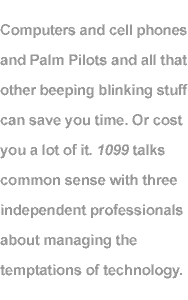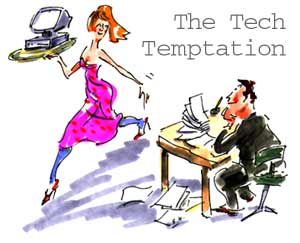 |
|
||||||||||||
 |
|
||||||||||||

|

|
|
By Sarah Dry
|
Like any self-respecting musician, Harvey Reid goes to where the gigs are, but just because he's on the move doesn't mean he's out of touch. That's the glory and the danger of technology. While he's on the road, the esteemed fingerpicking guitar player and independent label owner coordinates mailing lists from his laptop, locates backroad venues with a global positioning system, and downloads MP3s of his favorite music. Reid never has to settle for the local sports call-in show. The only major disadvantage of all the electronic gadgetry, Reid says, is that sometimes it gives him too much practical access and too little room for whimsy. "When I travel," he says, "I don't have to invent ways to kill time, and so I don't get to watch dumb Kung Fu movies in hotels or go to cheesy tourist attractions. Those things actually make our lives richer." This observation broaches several important practical and philosophical issues that technology increasingly forces business people -- especially overloaded independent professionals -- to address: what is the proper use of technology in our professional lives? What do we gain from it? What do we lose? Technology's temptations are many: it can be hard to resist a fetchingly-designed, souped-up device that promises to overhaul ("revolutionize," even) the way you do business, increase the time you spend with your family, and lower your golf handicap. To err is human, after all; to palm pilot, divine. But with so many devices to choose from, independent professionals are starting to make different choices about what they use and how they use it. If you're spending too much time juggling email or transferring data files from your PDA to your laptop to your desktop to your mother-in-law, you're in trouble. Of course, as independent professional media consultant Ken Karpay puts it: "If someone is successful, is making it, they're not letting technology run their lives." Reid, the musician and label owner, is refreshingly clear about technology's place in his business. "I use the computers for information and the guitar for music," he explains. "I don't even like to write a song with a word processor, since you can't write things faintly in the margin or draw lines through things, or arrows to switch them." Reid's philosophy -- "use it, don't abuse it" -- is becoming more and more common as people discover the limitations and unexpected side effects of technology devices. Sometimes a pencil is the perfect technology tool, and sometimes nothing but a two-way pager will do. One of technology's great advantages, of course, is that it has the potential to make you more efficient. For time-pressured IPs, being efficient is one of the principal means of leveling the playing field when competing against larger companies. "Some technology can really leverage your core capability and make you more efficient," says Karpay. "It's certainly worth $500 to free up two or three hours a week." Email, for example, cuts down on lagtime and postal fees; digital images can be beamed in an instant. On the other hand, free agents, who don't have the benefit of an IT department to answer questions, have to take time to educate themselves about what's out there and what they need: portable phones can enlarge the office (conference call from your bathtub!) but they also lengthen your hours (conference call from your bathtub?). Andrew McLaughlin is a legal consultant to the newly formed Internet Corporation for Assigned Names and Numbers, a global enterprise that has nine directors scattered around the world. Because the company has foreign offices, he says, "it's always business hours somewhere. Which means pressing email can arrive 24 hours a day, 7 days a week. Which means I check email in the morning when I get up, and at night just before I go to bed, and plenty of times in between." Needless to say, it gets wearying. McLaughlin points out an important difference between independent professionals and the rest of the world: "For anyone who's self-employed, there's no secretary to screen calls or perform triage on your email. Sorting and organizing takes at least as much time as responding." Independent professional Dank Pink, author of the forthcoming "Free Agent Nation," discovered a troubling phenomenon recently: If he goes a day without checking his email, it can take him up to a week to catch up. "Part of me says nothing is wrong with skipping a day, there's no need to be in simultaneous contact with everyone in the planet." But 200 emails staring him down a day later is a frightful prospect. Not all of the messages would be worth the time it would take to read them, either: A notoriously lazy medium, email tends to inspire quick, typo-riddled notes, rather than well-reasoned memos or compelling proposals, and despite the brainstorming, deal-making value of casual exchange with the world at large, the medium too often blows off the message. The key to juggling the demands of devices like cell phones, pagers, GPS systems and high-speed internet connections is, alas, old-fashioned and decidedly low-tech: simple self-appraisal. Learn to distinguish a siren call from a foghorn, a seduction from a sensible message. Fantasize about how an XPS566K Megatron will ramp things up for you. And then. . . snap out of it. That queasy feeling in your stomach is your conscience telling you what you already knew: you don't need the Megatron, the Omnitron will do just fine. |
||||
|
| |||||
|
July 16, 1999 Edited by Eric Gershon Illustration by Evzen Holas Production by Keith Gendel |
We'd love to hear your comments about this article! Sarah Dry is a freelance writer and book editor who lives in Boston. Her most recent article for 1099 was a "Day in the Life" of healthcare consultant Matthew McClain.. | ||||
| |||||